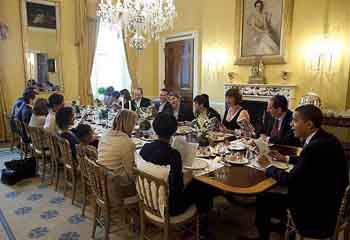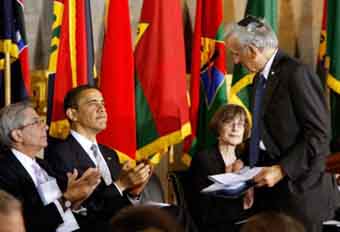
|
|
President Barack Obama hosted close friends and staff at a private White House seder on Passover.
| |

President Obama’s First 100 Days: A Jewish Perspective
-- Marc R. Stanley
During his first 100 days in office, the American Jewish community has
already taken great pleasure with the performance of President Barack
Obama. He has begun to develop a deep and substantive relationship
with the Jewish community by, among other things, hosting the first
presidential Seder, creating strong outreach with our community, and
working on key domestic and international issues of interest to
American Jews. Impressively, in less than three and a half months,
the Obama administration has already made marked progress with
progressive policies that are important to our community: the economy,
Israel, the Middle East, reproductive rights, renewable energy, and
stem cell research.
The aforementioned Seder caused quite a buzz in our community. Not
only was it the first presidential Seder in our nation’s history, but
it has become symbolic of the intimate and deep relationship our
president has with our community (I must have received 50 photos of
the Seder from friends and family). Not only has the President
embraced one of our most important rituals, he has comforted us as a
community by including in his administration individuals with whom we
have long-standing, close relationships. Obama has put together a
dream team of excellent advisors and appointments, several of whom are
members of our faith.
As a community, we are grateful that the President has spoken out
loudly against hate and intolerance. Last week, President Obama spoke
at the Holocaust Days of Remembrance ceremony at the U.S. Capitol and
called on Americans to “contemplate the obligations of the living” and
fight against “those who insist the Holocaust never happened, who
perpetrate every form of intolerance.” Earlier this month, under his
direction, the U.S. boycotted a vehemently anti-Israel United Nation’s
conference on racism (Durban II).

|
|
President Obama applauded Holocaust survivor Elie Wiesel during a recent Holocaust remembrance ceremony.
| |
Being a leader in the Jewish community during the Obama administration
means more than just being invited to Hanukkah parties and events at
the White House. Thus far, the Obama administration has made a
concerted effort to communicate with and involve our community in
major policy decisions. For example, the administration briefed
Jewish community leaders on regular high-level conference calls during
the formulation of policy toward Durban II. Before then, the
administration invited community leaders to participate in a hour-long
conference call with George Mitchell, U.S. special envoy to the Middle
East. The conversation was substantive, candid and meaningful. Those
on the call were impressed by both Mitchell’s grasp of the issues and
his attentiveness to the participants’ questions.
In these first 100 days, the most senior members of this
administration not only reached out to the Jewish community, they
listened. Although Obama’s critics continue to search for ways to
prove that he is anti-Israel, their message lacks substance and has
very little resonance within the wider Jewish community.
Of critical importance to us, Obama’s foreign policy has immeasurably
improved America’s image abroad. Both his foreign and his domestic
policy objectives make Israel and the U.S. more secure. The
President’s policies moving America toward renewable energy and off
Middle East oil have already begun to be implemented. These
priorities, as well as those whom Obama has appointed to serve in his
administration, subscribe to strategies that give the utmost
importance to Israel’s peace and security.
On the domestic front, Obama has acted swiftly on critical issues and
has revised some of President George W. Bush’s damaged policies. On
the economy, the President has shown bold leadership to lead America’s
economy out of this crisis and will create or save millions of
American jobs, provide tax relief, and invest in our long-term
economic security. Obama also ensured that we will not fall behind
other leading countries in important areas of research and development
by lifting the ban on federal funding for embryonic stem cell
research. Exploring this burgeoning field will ensure that the U.S. is
expanding its scientific frontier and provide Americans with the most
advanced medical treatments.
As with stem cells, the President chose good policy over partisan
politics when he struck down the infamous Global Gag rule, which
prohibited U.S. money from funding international family-planning
clinics. This provided life saving health services to women and also
provided counseling or referrals about abortion services. And
finally, after many years of politicization at the FDA, Obama is
putting science over blind ideology, including allowing Plan B, the
morning after pill, to be available without a prescription to women 17
and older.
We should not overstate the importance of Obama’s first 100 days.
There are, after all, over 1,300 days left in the President’s first
term. However, we are happy to say that the first 15 weeks of his
presidency have made us proud and have fulfilled his promise of much
needed change for our country.
Marc R. Stanley is Chairman of the National Jewish Democratic Council.
Did you enjoy this article?
If so,
- share it with your friends
so they do not miss out on this article,
- subscribe
(free), so you do not miss out on the next issue,
-
 donate
(not quite free but greatly appreciated) to enable us to continue
providing this free service. donate
(not quite free but greatly appreciated) to enable us to continue
providing this free service.
If not,
|